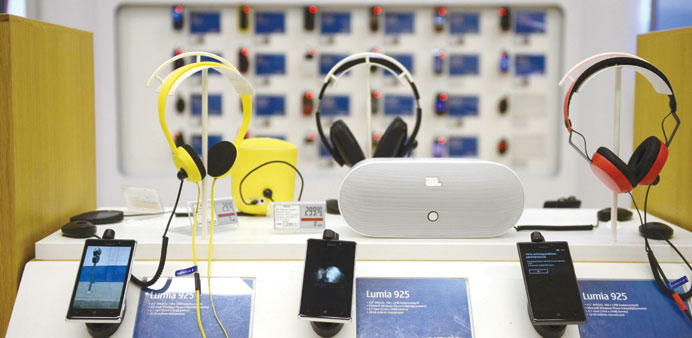|
Nokia has reported a steep fall in sales at its network equipment division, the main business which it will be left with once it has sold its former flagship phone business to Microsoft for €5.4bn ($7.4bn). |
The company said that the Nokia Solutions and Networks (NSN) division’s fourth-quarter sales were down 22% on a year ago at €3.1bn and it would embark on a new sales drive later this year.
Meanwhile, sales in the Devices and Services division which it is selling to Microsoft fell 29% to around €2.6bn due to “competitive industry dynamics”.
NSN accounts for around 90% of the company after the Microsoft deal closes.
“The fourth quarter was slightly disappointing,” said Inderes analyst Mikael Rautanen. “Minus 22% was a heavier decline than was expected.”
Analysts had on average forecast sales of €3.2bn, according to a Reuters poll.
The unit turned profitable in 2012 after slashing costs and shedding unprofitable businesses, helping to offset losses in its ailing mobile phone business.
But analysts have said it now needs to concentrate on winning more business as high research and development costs in mobile broadband technology mean bigger players have an advantage.
“They have cut costs and made profits for several quarters, but it’s important that sales will stabilise and grow in the second half of this year.” said Greger Johansson at research firm Redeye.
The company said it would make an aggressive push this year to gain market share against industry leader Ericsson as well as Chinese rival Huawei, and would aim for year-on-year sales growth in the second half.
NSN’s chief executive Rajeev Suri said it would be helped by recent deals with carriers such as Sprint in the US and China Mobile.
However, analysts expect such sales growth will come at the expense of margins. NSN’s operating margin last year rose to 9.7% from 5.7% in 2012 but the seasonally strong fourth-quarter margin fell to 11.2% from 14.4% in the same period of 2012.
NSN said the margin in the current first quarter is likely to fall to around 5% due to seasonal factors, but for the full year aims to keep it at the higher end of its targeted long-term range of 5 to 10%.
Despite the growth challenges for NSN, however, the results showed the company in stronger financial health without the phone business, which reported an adjusted operating loss of €191mn in the fourth quarter and showed the difficulties Microsoft will face in breaking into a consumer market which apart from Apple is now dominated by phones running on Google’s Android operating system.
Nokia’s former chief executive Stephen Elop made the controversial decision to adopt Microsoft’s Windows Phone operating software in an attempt to recover from a late start in smartphones.
But a limited marketing budget and an initial lack of popular apps made it hard for Nokia’s smartphones to compete against market leaders Samsung and Apple.
It launched a wide range of handsets last year, winning positive reviews from critics, but by then investors were growing increasingly concerned about the company’s finances.
The Microsoft sale, due to be finalised in the first quarter, is expected to return Nokia to an investment-grade credit rating while still allowing it to return some of the cash to shareholders.
Nokia last year suspended its annual dividend for the first time in its 148-year history in an attempt to preserve cash.
But it said little on Thursday on how the company will be run after the Microsoft deal is completed and only that the board was still deliberating on the company’s future corporate and capital structure and on how much to pay out to shareholders.
Some investors found that disappointing.
“Investors are left cold here. Not a word about the new strategy, the dividend decision is due to come later and the NSN result was short of expectations,” said Alandsbanken fund manager Jari Honko.

